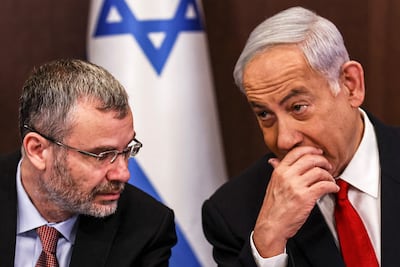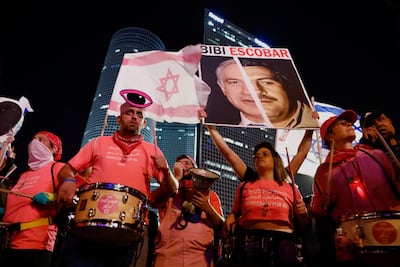“I need you — we need everyone to come to Jerusalem so a clear voice in favour of the reform will be heard,” Israeli Justice Minister Yariv Levin told supporters in Jerusalem.
The minister stood among a sea of Israeli flags wrapping round Jerusalem's government district last week, lauding “the referendum six months ago”.
By “referendum”, he was referring to the elections that swept Prime Minister Benjamin Netanyahu's government — the most right wing in Israel's history — into power.
At the end of last week, about 200,000 Israelis from across the country showed that the government could pull together the same support that anti-overhaul protesters have amassed in weekly demonstrations since in December.
Until now, mass protests throughout the country had focused on what demonstrators viewed as the coalition's potentially fatal attacks on democratic institutions.
But government supporters, many of whom travelled for hours on organised bus convoys, were less single-minded in their reason for turning up.
Yehuda, a student in a religious school, told The National that young people like him “should vote for the judicial reforms because we’re the next generation of Israelis”.
“We’re building the future,” he said.
But judicial reforms were only a small part of what he and his friends wanted to advocate. Much more attention was given to security.
“Young Israelis are more right wing than the older generation because of security,” he said. “We tried to give land back to the Arabs and it didn’t work. They still bomb us. There’s no peace with them, only force works.”
At one point, an older bystander butted in to say “but we don't hate Arabs” and Yehuda agreed.
Yoram, a teacher, was angry at the Supreme Court but more because of its policies than its position in Israel's political system.
“The families of terrorists here in Israel — who shoot at us, massacre us and kill us — receive national insurance and therefore permit themselves to continue executing terrorist attacks,” he said.
“If the Supreme Court would only decide — as the people so want — that these families will not receive any such benefits, the terror will stop.”
Amid such rampant fears about the conflict between Israelis and Palestinians, Ayala, who works in a music school, stuck out.
She voted for firebrand extreme-right National Security Minister Itamar Ben-Gvir, who has advocated a total annexation of the West Bank, which is home to about three million Palestinians.
“I don’t think that this has anything to do with Arabs,” she said. “This is about Jewish racism towards other Jews.”
In her mind, politicians such as Mr Ben-Gvir represent a chance for racial justice.
“When I was deciding who to vote for, I simply looked at each man. I really felt like Ben-Gvir is a man of truth. He's there for us.”
Ayala's family are Mizrahi, Jews who came to Israel from across the Middle East and North Africa.
She was keen to stress her closer connection to Arabs than European Ashkenazi Jews, whom she said built Israel's institutions while Jews from other part of the world “carried the stones”.
“My family loves [Muslim Egyptian singer] Umm Kulthum. She’s part of our culture, unlike the western Jews. We put music like hers in our synagogues for our most holy days,” she says.
Her response to a question about Mr Levin's judicial overhaul was simple: “This protest has nothing to do with the legal reforms.”
Meir, a Talmudic student, disagreed. He described the Supreme Court as “a very closed clique that expresses on the views of a very small sector in Israel’s public, the progressive and radical left”.
He was born in Israel, but grew up in the US, and believes the latter's system — in which Supreme Court judges are politically appointed — is a lot fairer.
“Israel is the only place besides Turkey and Iran where the judges vote which judges come in,” he said.
“Nowhere in the western countries does the same happen. You can see it statistically. The decisions are always left or radical left ones and always against the Israeli parliament, which is chosen by the people, unlike the court.”
Meir was the only person that spoke to The National at length about the judicial overhaul. But however varied the reasons for turning up to Jerusalem might have been, there was still a uniform belief that the legal system would soon have to change.
Yoram explained his confidence it would happen with a Hebrew saying.
“The groove has already been ploughed into the earth” — meaning if not now, then at some point down the line.
COMPANY%20PROFILE
%3Cp%3ECompany%20name%3A%20Znap%3C%2Fp%3E%0A%3Cp%3EStarted%3A%202017%3C%2Fp%3E%0A%3Cp%3EFounder%3A%20Uday%20Rathod%3C%2Fp%3E%0A%3Cp%3EBased%3A%20Dubai%2C%20UAE%3C%2Fp%3E%0A%3Cp%3EIndustry%3A%20FinTech%3C%2Fp%3E%0A%3Cp%3EFunding%20size%3A%20%241m%2B%3C%2Fp%3E%0A%3Cp%3EInvestors%3A%20Family%2C%20friends%3C%2Fp%3E%0A
Sholto Byrnes on Myanmar politics
More on animal trafficking
Company%20profile
%3Cp%3E%3Cstrong%3EName%3A%3C%2Fstrong%3E%20JustClean%3Cbr%3E%3Cbr%3E%3Cstrong%3EBased%3A%20%3C%2Fstrong%3EDubai%20with%20offices%20in%20other%20GCC%20countries%3Cbr%3E%3Cbr%3E%3Cstrong%3ELaunch%20year%3A%3C%2Fstrong%3E%202016%3Cbr%3E%3Cbr%3E%3Cstrong%3ENumber%20of%20employees%3A%3C%2Fstrong%3E%20160%2B%20with%2021%20nationalities%20in%20eight%20cities%3Cbr%3E%3Cstrong%3E%3Cbr%3ESector%3A%3C%2Fstrong%3E%20online%20laundry%20and%20cleaning%20services%3Cbr%3E%3Cbr%3E%3Cstrong%3EFunding%3A%20%3C%2Fstrong%3E%2430m%20from%20Kuwait-based%20Faith%20Capital%20Holding%20and%20Gulf%20Investment%20Corporation%3C%2Fp%3E%0A
How the bonus system works
The two riders are among several riders in the UAE to receive the top payment of £10,000 under the Thank You Fund of £16 million (Dh80m), which was announced in conjunction with Deliveroo's £8 billion (Dh40bn) stock market listing earlier this year.
The £10,000 (Dh50,000) payment is made to those riders who have completed the highest number of orders in each market.
There are also riders who will receive payments of £1,000 (Dh5,000) and £500 (Dh2,500).
All riders who have worked with Deliveroo for at least one year and completed 2,000 orders will receive £200 (Dh1,000), the company said when it announced the scheme.
More from Rashmee Roshan Lall
Specs
Engine: 51.5kW electric motor
Range: 400km
Power: 134bhp
Torque: 175Nm
Price: From Dh98,800
Available: Now
The biog
Favourite colour: Brown
Favourite Movie: Resident Evil
Hobbies: Painting, Cooking, Imitating Voices
Favourite food: Pizza
Trivia: Was the voice of three characters in the Emirati animation, Shaabiyat Al Cartoon
The finalists
Player of the Century, 2001-2020: Cristiano Ronaldo (Juventus), Lionel Messi (Barcelona), Mohamed Salah (Liverpool), Ronaldinho
Coach of the Century, 2001-2020: Pep Guardiola (Manchester City), Jose Mourinho (Tottenham Hotspur), Zinedine Zidane (Real Madrid), Sir Alex Ferguson
Club of the Century, 2001-2020: Al Ahly (Egypt), Bayern Munich (Germany), Barcelona (Spain), Real Madrid (Spain)
Player of the Year: Cristiano Ronaldo, Lionel Messi, Robert Lewandowski (Bayern Munich)
Club of the Year: Bayern Munich, Liverpool, Real Madrid
Coach of the Year: Gian Piero Gasperini (Atalanta), Hans-Dieter Flick (Bayern Munich), Jurgen Klopp (Liverpool)
Agent of the Century, 2001-2020: Giovanni Branchini, Jorge Mendes, Mino Raiola
PREMIER LEAGUE FIXTURES
Saturday (UAE kick-off times)
Watford v Leicester City (3.30pm)
Brighton v Arsenal (6pm)
West Ham v Wolves (8.30pm)
Bournemouth v Crystal Palace (10.45pm)
Sunday
Newcastle United v Sheffield United (5pm)
Aston Villa v Chelsea (7.15pm)
Everton v Liverpool (10pm)
Monday
Manchester City v Burnley (11pm)
AWARDS
%3Cp%3E%3Cstrong%3EBest%20Male%20black%20belt%3A%20%3C%2Fstrong%3ELucas%20Protasio%20(BRA)%3Cbr%3E%3Cstrong%3EBest%20female%20black%20belt%3A%20%3C%2Fstrong%3EJulia%20Alves%20(BRA)%3Cbr%3E%3Cstrong%3EBest%20Masters%20black%20belt%3A%3C%2Fstrong%3E%20Igor%20Silva%20(BRA)%3Cbr%3E%3Cstrong%3EBest%20Asian%20Jiu-Jitsu%20Federation%3A%3C%2Fstrong%3E%20Kazakhstan%3Cbr%3E%3Cstrong%3EBest%20Academy%20in%20UAE%3A%20%3C%2Fstrong%3ECommando%20Group%2C%20Abu%20Dhabi%3Cbr%3E%3Cstrong%3EBest%20International%20Academy%3A%3C%2Fstrong%3E%20Commando%20Group%2C%20Abu%20Dhabi%3Cbr%3E%3Cstrong%3EAfrican%20Player%20of%20the%20Year%3A%20%3C%2Fstrong%3EKatiuscia%20Yasmira%20Dias%20(GNB)%3Cbr%3E%3Cstrong%3EOceanian%20Player%20of%20the%20Year%3A%20%3C%2Fstrong%3EAnton%20Minenko%20(AUS)%3Cbr%3E%3Cstrong%3EEuropean%20Player%20of%20the%20Year%3A%3C%2Fstrong%3E%20Rose%20El%20Sharouni%20(NED)%3Cbr%3E%3Cstrong%3ENorth%20and%20Central%20American%20Player%20of%20the%20Year%3A%20%3C%2Fstrong%3EAlexa%20Yanes%20(USA)%3Cbr%3E%3Cstrong%3EAsian%20Player%20of%20the%20Year%3A%20%3C%2Fstrong%3EZayed%20Al%20Katheeri%20(UAE)%3Cbr%3E%3Cstrong%3ERookie%20of%20the%20Year%3A%3C%2Fstrong%3E%20Rui%20Neto%20(BRA)Rui%20Neto%20(BRA)%3C%2Fp%3E%0A
Players Selected for La Liga Trials
U18 Age Group
Name: Ahmed Salam (Malaga)
Position: Right Wing
Nationality: Jordanian
Name: Yahia Iraqi (Malaga)
Position: Left Wing
Nationality: Morocco
Name: Mohammed Bouherrafa (Almeria)
Position: Centre-Midfield
Nationality: French
Name: Mohammed Rajeh (Cadiz)
Position: Striker
Nationality: Jordanian
U16 Age Group
Name: Mehdi Elkhamlichi (Malaga)
Position: Lead Striker
Nationality: Morocco
The%20specs
%3Cp%3E%3Cstrong%3EEngine%3A%3C%2Fstrong%3E%201.8-litre%204-cyl%20turbo%0D%3Cbr%3E%3Cstrong%3EPower%3A%20%3C%2Fstrong%3E190hp%20at%205%2C200rpm%0D%3Cbr%3E%3Cstrong%3ETorque%3A%3C%2Fstrong%3E%20320Nm%20from%201%2C800-5%2C000rpm%0D%3Cbr%3E%3Cstrong%3ETransmission%3A%20%3C%2Fstrong%3ESeven-speed%20dual-clutch%20auto%0D%3Cbr%3E%3Cstrong%3EFuel%20consumption%3A%3C%2Fstrong%3E%206.7L%2F100km%0D%3Cbr%3E%3Cstrong%3EPrice%3A%3C%2Fstrong%3E%20From%20Dh111%2C195%0D%3Cbr%3E%3Cstrong%3EOn%20sale%3A%20%3C%2Fstrong%3ENow%3C%2Fp%3E%0A
JUDAS AND THE BLACK MESSIAH
Directed by: Shaka King
Starring: Daniel Kaluuya, Lakeith Stanfield, Jesse Plemons
Four stars
Financial considerations before buying a property
Buyers should try to pay as much in cash as possible for a property, limiting the mortgage value to as little as they can afford. This means they not only pay less in interest but their monthly costs are also reduced. Ideally, the monthly mortgage payment should not exceed 20 per cent of the purchaser’s total household income, says Carol Glynn, founder of Conscious Finance Coaching.
“If it’s a rental property, plan for the property to have periods when it does not have a tenant. Ensure you have enough cash set aside to pay the mortgage and other costs during these periods, ideally at least six months,” she says.
Also, shop around for the best mortgage interest rate. Understand the terms and conditions, especially what happens after any introductory periods, Ms Glynn adds.
Using a good mortgage broker is worth the investment to obtain the best rate available for a buyer’s needs and circumstances. A good mortgage broker will help the buyer understand the terms and conditions of the mortgage and make the purchasing process efficient and easier.
More on animal trafficking
No more lice
Defining head lice
Pediculus humanus capitis are tiny wingless insects that feed on blood from the human scalp. The adult head louse is up to 3mm long, has six legs, and is tan to greyish-white in colour. The female lives up to four weeks and, once mature, can lay up to 10 eggs per day. These tiny nits firmly attach to the base of the hair shaft, get incubated by body heat and hatch in eight days or so.
Identifying lice
Lice can be identified by itching or a tickling sensation of something moving within the hair. One can confirm that a person has lice by looking closely through the hair and scalp for nits, nymphs or lice. Head lice are most frequently located behind the ears and near the neckline.
Treating lice at home
Head lice must be treated as soon as they are spotted. Start by checking everyone in the family for them, then follow these steps. Remove and wash all clothing and bedding with hot water. Apply medicine according to the label instructions. If some live lice are still found eight to 12 hours after treatment, but are moving more slowly than before, do not re-treat. Comb dead and remaining live lice out of the hair using a fine-toothed comb.
After the initial treatment, check for, comb and remove nits and lice from hair every two to three days. Soak combs and brushes in hot water for 10 minutes.Vacuum the floor and furniture, particularly where the infested person sat or lay.
Courtesy Dr Vishal Rajmal Mehta, specialist paediatrics, RAK Hospital
Company%20profile
%3Cp%3E%3Cstrong%3ECompany%20name%3A%20%3C%2Fstrong%3EHakbah%0D%3Cbr%3E%3Cstrong%3EStarted%3A%20%3C%2Fstrong%3E2018%0D%3Cbr%3E%3Cstrong%3EFounder%3A%20%3C%2Fstrong%3ENaif%20AbuSaida%0D%3Cbr%3E%3Cstrong%3EBased%3A%20%3C%2Fstrong%3ESaudi%20Arabia%0D%3Cbr%3E%3Cstrong%3ESector%3A%20%3C%2Fstrong%3EFinTech%0D%3Cbr%3E%3Cstrong%3ECurrent%20number%20of%20staff%3A%20%3C%2Fstrong%3E22%20%0D%3Cbr%3E%3Cstrong%3EInitial%20investment%3A%20%3C%2Fstrong%3E%24200%2C000%0D%3Cbr%3E%3Cstrong%3EInvestment%20stage%3A%20%3C%2Fstrong%3Epre-Series%20A%0D%3Cbr%3E%3Cstrong%3EInvestors%3A%20%3C%2Fstrong%3EGlobal%20Ventures%20and%20Aditum%20Investment%20Management%0D%3Cbr%3E%3Cbr%3E%3C%2Fp%3E%0A
The%20specs%3A%20Taycan%20Turbo%20GT
%3Cp%3E%3Cstrong%3EEngine%3A%20%3C%2Fstrong%3EDual%20synchronous%20electric%20motors%0D%3Cbr%3E%3Cstrong%3EPower%3A%20%3C%2Fstrong%3E1%2C108hp%0D%3Cbr%3E%3Cstrong%3ETorque%3A%20%3C%2Fstrong%3E1%2C340Nm%0D%3Cbr%3E%3Cstrong%3ETransmission%3A%20%3C%2Fstrong%3ESingle-speed%20automatic%20(front%20axle)%3B%20two-speed%20transmission%20(rear%20axle)%0D%3Cbr%3E%3Cstrong%3ETouring%20range%3A%20%3C%2Fstrong%3E488-560km%0D%3Cbr%3E%3Cstrong%3EPrice%3A%20%3C%2Fstrong%3EFrom%20Dh928%2C400%0D%3Cbr%3E%3Cstrong%3EOn%20sale%3A%20%3C%2Fstrong%3EOrders%20open%3C%2Fp%3E%0A
'Manmarziyaan' (Colour Yellow Productions, Phantom Films)
Director: Anurag Kashyap
Cast: Abhishek Bachchan, Taapsee Pannu, Vicky Kaushal
Rating: 3.5/5
The burning issue
The internal combustion engine is facing a watershed moment – major manufacturer Volvo is to stop producing petroleum-powered vehicles by 2021 and countries in Europe, including the UK, have vowed to ban their sale before 2040. The National takes a look at the story of one of the most successful technologies of the last 100 years and how it has impacted life in the UAE.
Read part four: an affection for classic cars lives on
Read part three: the age of the electric vehicle begins
Read part one: how cars came to the UAE
THE%20STRANGERS'%20CASE
%3Cp%3E%3Cstrong%3EDirector%3C%2Fstrong%3E%3A%20Brandt%20Andersen%3Cbr%3E%3Cstrong%3EStarring%3A%20%3C%2Fstrong%3EOmar%20Sy%2C%20Jason%20Beghe%2C%20Angeliki%20Papoulia%3Cbr%3E%3Cstrong%3ERating%3A%3C%2Fstrong%3E%204%2F5%3C%2Fp%3E%0A
DMZ facts
- The DMZ was created as a buffer after the 1950-53 Korean War.
- It runs 248 kilometers across the Korean Peninsula and is 4km wide.
- The zone is jointly overseen by the US-led United Nations Command and North Korea.
- It is littered with an estimated 2 million mines, tank traps, razor wire fences and guard posts.
- Donald Trump and Kim Jong-Un met at a building in Panmunjom, where an armistice was signed to stop the Korean War.
- Panmunjom is 52km north of the Korean capital Seoul and 147km south of Pyongyang, North Korea’s capital.
- Former US president Bill Clinton visited Panmunjom in 1993, while Ronald Reagan visited the DMZ in 1983, George W. Bush in 2002 and Barack Obama visited a nearby military camp in 2012.
- Mr Trump planned to visit in November 2017, but heavy fog that prevented his helicopter from landing.
CABINET%20OF%20CURIOSITIES%20EPISODE%201%3A%20LOT%2036
%3Cp%3E%3Cstrong%3EDirector%3A%20%3C%2Fstrong%3EGuillermo%20del%20Toro%3Cbr%3E%3Cstrong%3EStars%3A%3C%2Fstrong%3E%20Tim%20Blake%20Nelson%2C%20Sebastian%20Roche%2C%20Elpidia%20Carrillo%3Cbr%3ERating%3A%204%2F5%3C%2Fp%3E%0A
White hydrogen: Naturally occurring hydrogen
Chromite: Hard, metallic mineral containing iron oxide and chromium oxide
Ultramafic rocks: Dark-coloured rocks rich in magnesium or iron with very low silica content
Ophiolite: A section of the earth’s crust, which is oceanic in nature that has since been uplifted and exposed on land
Olivine: A commonly occurring magnesium iron silicate mineral that derives its name for its olive-green yellow-green colour
More from Neighbourhood Watch:
Wicked: For Good
Director: Jon M Chu
Starring: Ariana Grande, Cynthia Erivo, Jonathan Bailey, Jeff Goldblum, Michelle Yeoh, Ethan Slater
Rating: 4/5
MATCH INFO
Uefa Champions League semi-final, second leg result:
Ajax 2-3 Tottenham
Tottenham advance on away goals rule after tie ends 3-3 on aggregate
Final: June 1, Madrid
New UK refugee system
- A new “core protection” for refugees moving from permanent to a more basic, temporary protection
- Shortened leave to remain - refugees will receive 30 months instead of five years
- A longer path to settlement with no indefinite settled status until a refugee has spent 20 years in Britain
- To encourage refugees to integrate the government will encourage them to out of the core protection route wherever possible.
- Under core protection there will be no automatic right to family reunion
- Refugees will have a reduced right to public funds
Winners
Best Men's Player of the Year: Kylian Mbappe (PSG)
Maradona Award for Best Goal Scorer of the Year: Robert Lewandowski (Bayern Munich)
TikTok Fans’ Player of the Year: Robert Lewandowski
Top Goal Scorer of All Time: Cristiano Ronaldo (Manchester United)
Best Women's Player of the Year: Alexia Putellas (Barcelona)
Best Men's Club of the Year: Chelsea
Best Women's Club of the Year: Barcelona
Best Defender of the Year: Leonardo Bonucci (Juventus/Italy)
Best Goalkeeper of the Year: Gianluigi Donnarumma (PSG/Italy)
Best Coach of the Year: Roberto Mancini (Italy)
Best National Team of the Year: Italy
Best Agent of the Year: Federico Pastorello
Best Sporting Director of the Year: Txiki Begiristain (Manchester City)
Player Career Award: Ronaldinho
Veil (Object Lessons)
Rafia Zakaria
Bloomsbury Academic
Test
Director: S Sashikanth
Cast: Nayanthara, Siddharth, Meera Jasmine, R Madhavan
Star rating: 2/5
Which honey takes your fancy?
Al Ghaf Honey
The Al Ghaf tree is a local desert tree which bears the harsh summers with drought and high temperatures. From the rich flowers, bees that pollinate this tree can produce delicious red colour honey in June and July each year
Sidr Honey
The Sidr tree is an evergreen tree with long and strong forked branches. The blossom from this tree is called Yabyab, which provides rich food for bees to produce honey in October and November. This honey is the most expensive, but tastiest
Samar Honey
The Samar tree trunk, leaves and blossom contains Barm which is the secret of healing. You can enjoy the best types of honey from this tree every year in May and June. It is an historical witness to the life of the Emirati nation which represents the harsh desert and mountain environments
ARSENAL IN 1977
Feb 05 Arsenal 0-0 Sunderland
Feb 12 Manchester City 1-0 Arsenal
Feb 15 Middlesbrough 3-0 Arsenal
Feb 19 Arsenal 2-3 West Ham
Feb 26 Middlesbrough 4-1 Arsenal (FA Cup)
Mar 01 Everton 2-1 Arsenal
Mar 05 Arsenal 1-4 ipswich
March 08 Arsenal 1-2 West Brom
Mar 12 QPR 2-1 Arsenal
Mar 23 Stoke 1-1 Arsenal
Apr 02 Arsenal 3-0 Leicester
Ms Yang's top tips for parents new to the UAE
- Join parent networks
- Look beyond school fees
- Keep an open mind
WITHIN%20SAND
%3Cp%3EDirector%3A%20Moe%20Alatawi%3C%2Fp%3E%0A%3Cp%3EStarring%3A%20Ra%E2%80%99ed%20Alshammari%2C%20Adwa%20Fahd%2C%20Muhand%20Alsaleh%3C%2Fp%3E%0A%3Cp%3ERating%3A%203%2F5%3C%2Fp%3E%0A
What to watch out for:
Algae, waste coffee grounds and orange peels will be used in the pavilion's walls and gangways
The hulls of three ships will be used for the roof
The hulls will painted to make the largest Italian tricolour in the country’s history
Several pillars more than 20 metres high will support the structure
Roughly 15 tonnes of steel will be used
The specs
Engine: 4.0-litre, twin-turbocharged V8
Transmission: nine-speed automatic
Power: 630bhp
Torque: 900Nm
Price: Dh810,000
Result
UAE (S. Tagliabue 90 1') 1-2 Uzbekistan (Shokhruz Norkhonov 48', 86')
The specs
Engine: 2.9-litre twin-turbo V6
Power: 540hp at 6,500rpm
Torque: 600Nm at 2,500rpm
Transmission: Eight-speed auto
Kerb weight: 1580kg
Price: From Dh750k
On sale: via special order
Racecard
2pm Handicap Dh 90,000 1,800m
2.30pm Handicap Dh120,000 1,950m
3pm Handicap Dh105,000 1,600m
3.30pm Jebel Ali Classic Conditions Dh300,000 1,400m
4pm Maiden Dh75,000 1,600m
4.30pm Conditions Dh250,000 1,400m
5pm Maiden Dh75,000 1,600m
5.30pm Handicap Dh85,000 1,000m
The National selections:
2pm Arch Gold
2.30pm Conclusion
3pm Al Battar
3.30pm Golden Jaguar
4pm Al Motayar
4.30pm Tapi Sioux
5pm Leadership
5.30pm Dahawi




